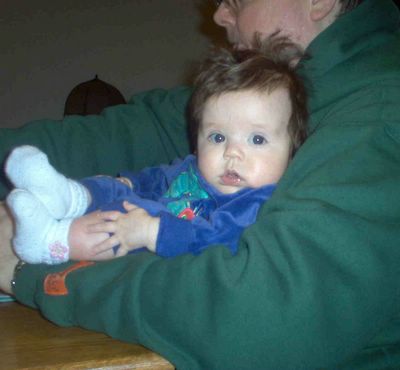Christina Aguilera, Bob Seger, Philip Glass, Fiona Apple, Miles Davis, The Postal Service, R. Kelly, Kansas, Alabama (or any other state, really), Cheetah, Charlotte Church, The Smiths (I know, I know. Tell me one more time and I'm gonna barf, I swear), Glenn Miller, Britney Spears, Steely Dan, Motley Crue, The Beastie Boys, Leontyne Price, and yes (brace yourselves) The Arcade Fire.
This is not to denigrate any of these artists. I quite like some of them, in moderation. But they're not me, not really. I never mind when people send me music, or ask me about it, because I know that an open and curious ear is part of the responsibility this blog has placed upon my head. I'm good with that. But I'm not, in fact, morally obligated to like everything. I try not to spend money on things I won't like, but beyond that, my ear is open.
Nevertheless, I wasn't quite ready for this. Popstrology purports to determine your identity based on the music that was popular in the year of your birth. Now, I should probably confess that I don't really believe in astrology, despite the fact that my birthday promises the world that I'm quite an entertaining person:
You are intensely emotional and strongly aware of the darker side of human nature. You don't live on the surface of life, but experience it at its deepest levels.
You possess an iron will, a strong ego and a unique personal magnetism. You make a loyal friend and a passionate lover.
You're also intuitive, ambitious and have a penetrating mind. You have a burning need to uncover what is hidden, whether it's a mystery or someone else's innermost secrets. You're rarely who you appear to be on the outside and are not easy to get to know.
Would that that were so! But no, despite my first mother-in-law's lament ("My son can't marry a Scorpio!"--though as it turned out she was right), I'm actually a fairly mellow person in most respects. (I'm similarly entertained by, but skeptical of, tarot and ouija. I sort of wish that they were real, but I've never seen anything to make me believe that, and I've looked, believe me.)
But popstrology seems a blunter object altogether. Maybe it's the by-the-year thing. Like Chinese astrology, I'm hesitant to believe that I have that much in common with those with whom I share a birth year (a hesitancy confirmed by my recent high school reunion. I was right, at 16: I have nothing in common with these people).
This isn't to say there's no wisdom in Popstrology. Consider:
Perhaps the roots of your chronic restlessness lie in the fact that you are an ABBA born in the Year of Debby Boone. Or perhaps the key to finally overcoming your crippling sexual inhibition is to acknowledge that you are a Pat Boone born in the Year of Elvis Presley. These and thousands of other possible lessons are to be found in the pop stars, and even popstrological novices can easily learn the tools necessary to reveal them.
or even better:
If you are an Olivia Newton-John who keeps on falling for Rod Stewarts, or if you are experiencing certain feelings that go along with being a Double George Michael, then the roots of your troubles may be straightforward and obvious. It is more likely, however, that the answer to your relationship issues will only be revealed through an analysis or your Birthstar's relationship to the forty-five constellations in the popstrological firmament.
This is getting to be way too much like math. ("Double George Michael" just means "gay," though, right?) But it's fun, and I encourage you, as a Johnny Rivers born in the third (and most thrilling of all) Year of the Beatles, to read yourselves.
For another fun time-waster, try this test, which determines the circle of hell into which you'll be cast, based on your sins and penchants. I, of course, am in the second circle, with the lustful. Paolo and Francesca, Helen of Troy, LJ, and me, are all going to have a hoot of a time getting drunk and talking about sex. I guess I shouldn't have answered "yes" to question 46: "Do you regularly check Sex Toyblogging at Raging PMS? Do you check back to see what other commenters have said?" Oops. Damn you, LJ! (shaking fist)
Thanks to refinnej for the heads up! Hope I wasn't too weird on the phone the other day; I was half asleep.






